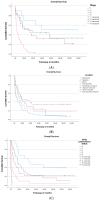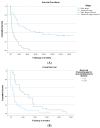Outcomes of Patients with Small Intestine Adenocarcinoma in a Canadian Province: A Retrospective Multi-Center Population-Based Cohort Study
- PMID: 35681560
- PMCID: PMC9252258
- DOI: 10.3390/cancers14112581
Outcomes of Patients with Small Intestine Adenocarcinoma in a Canadian Province: A Retrospective Multi-Center Population-Based Cohort Study
Abstract
Background: Small intestine adenocarcinoma is a rare cancer. The current study aims to determine the outcomes of patients with small intestine adenocarcinoma in a Canadian province. Methods: This retrospective population-based cohort study assessed patients with small intestine adenocarcinoma who were diagnosed from 2008 to 2017 in Saskatchewan. A Cox proportional multivariate regression analysis was performed to determine the correlation between survival and exploratory factors. Results: 112 eligible patients with a median age of 73 years and M:F of 47:53 were identified. Overall, 75% had a comorbid illness, and 45% had a WHO performance status >1. Of the 112 patients, 51 (46%) had early-stage disease and 61 (54%) had advanced-stage disease. The median overall survival (mOS) was as follows: stage one, 59 months; stage two, 30 months; stage three, 20 months; and stage four, 3 months (p < 0.001). The median disease-free survival of patients with stage three disease who received adjuvant chemotherapy was 26 months (95% CI:23.1−28.9) vs. 4 months (0.0−9.1) with observation (p = 0.04). Patients who received chemotherapy for advanced disease had a mOS of 10 months (3.5−16.5) vs. 2 months (0.45−3.6) without chemotherapy (p < 0.001). In the multivariate analysis, stage four disease, hazard ratio (HR), 3.20 (1.84−5.40); WHO performance status >1, HR, 2.22 (1.42−3.45); lack of surgery, HR, 2.10 (1.25−3.50); and a neutrophil:lymphocyte ratio of >4.5, HR, 1.72 (1.10−2.71) were significantly correlated with inferior survival. Conclusions: Most patients with small intestine adenocarcinoma were diagnosed with advanced-stage disease. Advanced-stage disease, poor performance status, lack of surgery and a baseline neutrophil:lymphocyte ratio >4.5 were correlated with inferior survival.
Keywords: metastasectomy; neutrophil lymphocyte ratio; outcomes; performance status; small intestine adenocarcinoma; small intestine cancer; stage; surgery; survival.
Conflict of interest statement
The authors declare no conflict of interest.
Figures



References
Grants and funding
LinkOut - more resources
Full Text Sources

